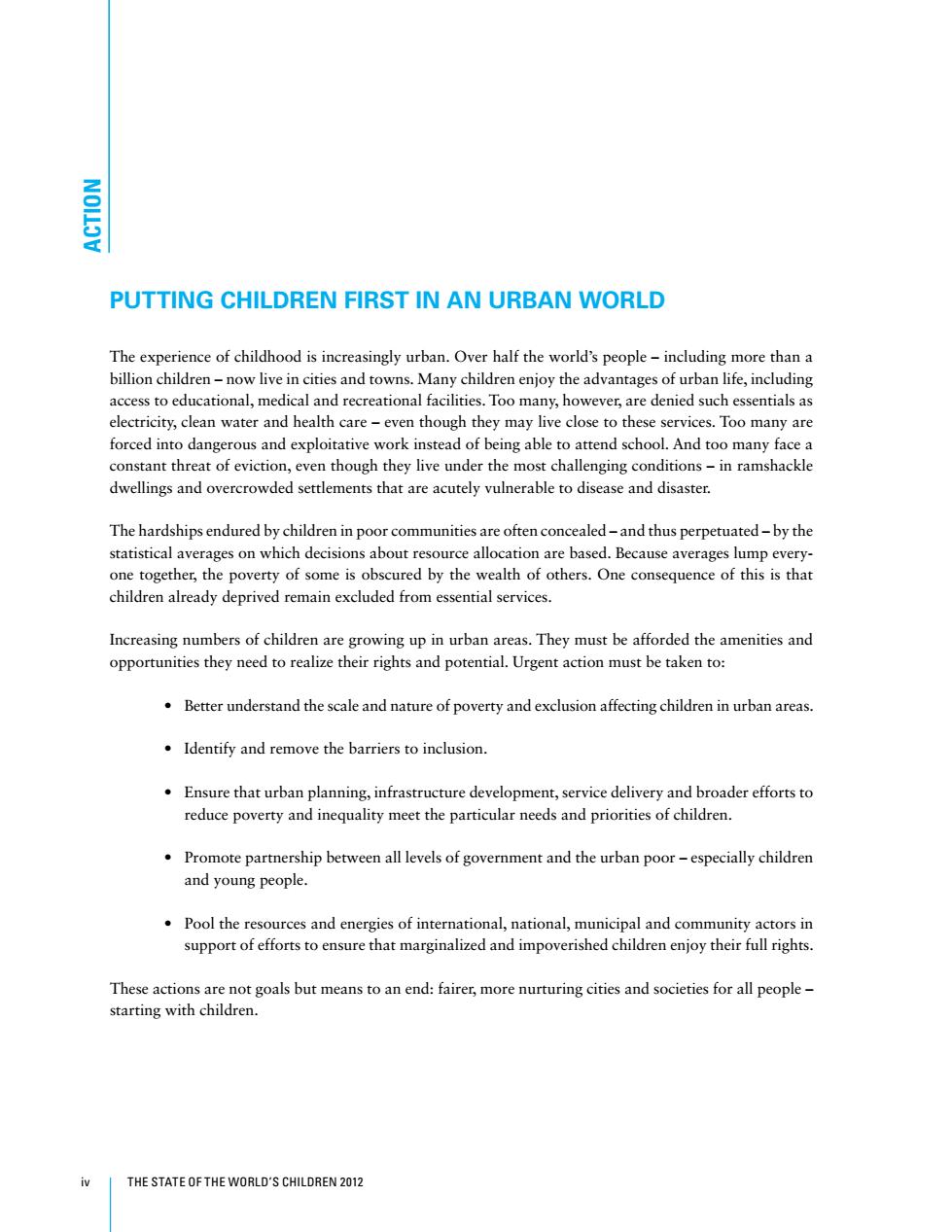正在加载图片...

PUTTING CHILDREN FIRST IN AN URBAN WORLD The experience of childhood is increasingly urban.Over half the world's people-including more than a billion children-now live in cities and towns.Many children enjoy the advantages of urban life,including access to educational,medical and recreational facilities.Too many,however,are denied such essentials as electricity,clean water and health care-even though they may live close to these services.Too many are forced into dangerous and exploitative work instead of being able to attend school.And too many face a constant threat of eviction,even though they live under the most challenging conditions-in ramshackle dwellings and overcrowded settlements that are acutely vulnerable to disease and disaster. The hardships endured by children in poor communities are often concealed-and thus perpetuated-by the statistical averages on which decisions about resource allocation are based.Because averages lump every- one together,the poverty of some is obscured by the wealth of others.One consequence of this is that children already deprived remain excluded from essential services. Increasing numbers of children are growing up in urban areas.They must be afforded the amenities and opportunities they need to realize their rights and potential.Urgent action must be taken to: Better understand the scale and nature of poverty and exclusion affecting children in urban areas. Identify and remove the barriers to inclusion. Ensure that urban planning,infrastructure development,service delivery and broader efforts to reduce poverty and inequality meet the particular needs and priorities of children. Promote partnership between all levels of government and the urban poor-especially children and young people. Pool the resources and energies of international,national,municipal and community actors in support of efforts to ensure that marginalized and impoverished children enjoy their full rights. These actions are not goals but means to an end:fairer,more nurturing cities and societies for all people- starting with children. THE STATE OF THE WORLD'S CHILDREN 2012iv THE STATE OF THE WORLD’S CHILDREN 2012 Putting children first in an urban world The experience of childhood is increasingly urban. Over half the world’s people – including more than a billion children – now live in cities and towns. Many children enjoy the advantages of urban life, including access to educational, medical and recreational facilities. Too many, however, are denied such essentials as electricity, clean water and health care – even though they may live close to these services. Too many are forced into dangerous and exploitative work instead of being able to attend school. And too many face a constant threat of eviction, even though they live under the most challenging conditions – in ramshackle dwellings and overcrowded settlements that are acutely vulnerable to disease and disaster. The hardships endured by children in poor communities are often concealed – and thus perpetuated – by the statistical averages on which decisions about resource allocation are based. Because averages lump everyone together, the poverty of some is obscured by the wealth of others. One consequence of this is that children already deprived remain excluded from essential services. Increasing numbers of children are growing up in urban areas. They must be afforded the amenities and opportunities they need to realize their rights and potential. Urgent action must be taken to: • Better understand the scale and nature of poverty and exclusion affecting children in urban areas. • Identify and remove the barriers to inclusion. • Ensure that urban planning, infrastructure development, service delivery and broader efforts to reduce poverty and inequality meet the particular needs and priorities of children. • Promote partnership between all levels of government and the urban poor – especially children and young people. • Pool the resources and energies of international, national, municipal and community actors in support of efforts to ensure that marginalized and impoverished children enjoy their full rights. These actions are not goals but means to an end: fairer, more nurturing cities and societies for all people – starting with children. ACTION